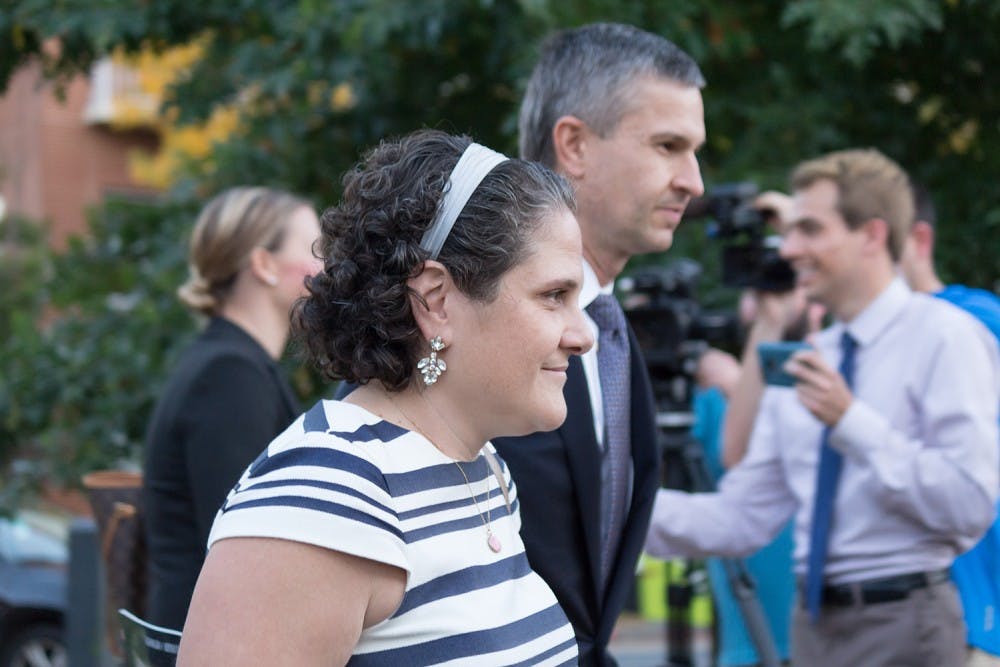“She was there for survivors, 100 percent,” Alex Pinkleton said of former Associate Dean Nicole Eramo Wednesday before a courtroom of jurors, legal counsel and spectators.
Pinkleton’s testimony was part of the ongoing trial for the $7.5 million lawsuit Eramo filed against Rolling Stone Magazine, Wenner Media, Inc. and Sabrina Rubin Erderly, author of the 2014 article “A Rape on Campus.”
While a student, Pinkleton was the outreach chair for One Less, a sexual advocacy group at the University, and heavily involved with Take Back the Night. In the spring of 2014, she reported her sexual assault experience online. That was when she first encountered Eramo and formed a friendship with her.
“She became a huge support for me,” Pinkleton said. “I ended up babysitting her son.”
Pinkleton was also a friend of Jackie — the central figure of Erdely’s article — at the time Jackie was involved with the story.
Throughout her direct examination, Pinkleton said she was upset with the way both herself and Eramo were portrayed by Erdely in the article. In fact, Pinkleton said she saw the way she was characterized in the article — a third-year “expertly clad in the U.Va.-after-dark uniform of a midriff-baring sleeveless top and shorts” — as Erdely’s way of trying to draw parallels between University student Hannah Graham, who was last seen wearing a black crop top.
Graham, then a second-year College student, disappeared in September 2014, and her body was found a month later in Albemarle County. Jesse Matthew Jr. pleaded guilty to the murders of Graham and Morgan Harrington in March. “A Rape on Campus” referenced Graham’s death and Matthew’s prior sexual assault charges.
“Clearly [Erdely] was trying to paint me as someone I wasn’t,” Pinkleton said. “I’m not an expert on how to get into frats — I can get into frats … I consider myself more of an expert of survivor help.”
Pinkleton admitted the quotes attributed to her in the article were accurate, but also said 90 percent of her conversations with Erdely revolved around advocacy and the influencing factors of “rape culture” at the University. In fact, Pinkleton said she was excited for the article to be published because she thought it would expose problems with the University’s sexual assault reporting process.
“I was still under the impression this would be something helpful for the advocacy community,” Pinkleton said. “Those were my feelings at the time.”
Pinkleton teared up while facing the jury and talking about the public’s negative reaction to Eramo after the article was published.
“People were very angry at me for supporting the ‘devil,’” Pinkleton said while choking up, before U.S. District Court Judge Glen Conrad ordered a break to allow her to compose herself.
Some community members still hold these feelings. Just last week, Eramo was called a “rape apologist" while she was outside the courtroom on lunch break.
Pinkleton became overwhelmed with emotion for a second time when Elizabeth McNamara, Rolling Stone’s attorney, had her read a letter she sent to Eramo after the debunked article was published.
“People weren’t there for you so f—k them,” Pinkleton said before beginning to cry. McNamara continued reading it for her, “You’re one of the strongest, most generous people I know, and f—k Rolling Stone for trying to paint the picture otherwise.”
As a part of the letter, McNamara read that Pinkleton wished Eramo “cheers to a successful lawsuit.”
Dean of Students Allen Groves also testified Wednesday morning. Groves said he had a favorable opinion of Eramo’s job performance, and he too disagreed with the way she was portrayed in the article.
“It painted Eramo as indifferent, cavalier, suppressing statistics,” Groves said. “A view of the environment as unsafe and not advocating for students.”
Title IX policy states that regardless of whether a victim of sexual assault wants to pursue formal or informal charges, the University is still required to investigate the information. Groves said it was difficult to conduct an investigation because of the limited information Jackie provided.
“[Jackie] was unwilling to give [the] name of attacker, was uncertain of the fraternity and so, based on that, [Eramo] supported Jackie and did not conduct an investigation,” Groves said.
Groves said he was frustrated with Jackie for her unwillingness to provide the facts needed to take action.
Rolling Stone’s deputy managing editor Sean Woods was the last to take the stand. Woods, who was also the assigning editor for “A Rape on Campus,” affirmed there are no written policies about how fact-checking should be conducted at Rolling Stone.
“I thought it was clear to the reader that it was all Jackie’s recollection. I’ve been criticized for this,” Woods said. “I really regret the way I handled this.”
Following Pinkleton’s time on the stand, the jury watched John Ritter’s video deposition. Ritter is the freelance illustrator who created the three photoshopped images for the article, including one of Eramo. He said he was paid roughly $2,500 for his work.
University Associate Dean of Students Laurie Casteen, also spent time on the stand. She said she tried to take pressure off Eramo by serving as a “buffer.” Casteen said she met with Jackie and helped to establish regular police patrols of her home, gave academic support and referred her to counseling.
The trial will resume Thursday at 8 a.m.







